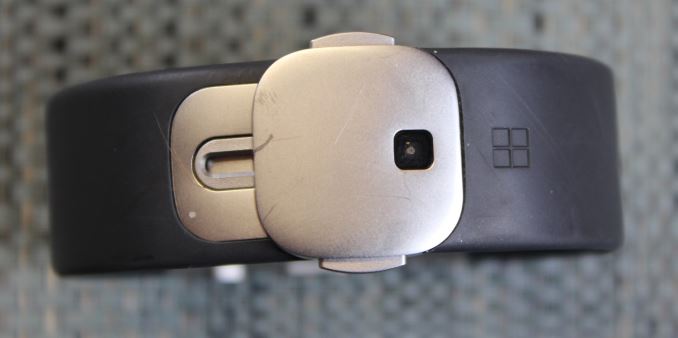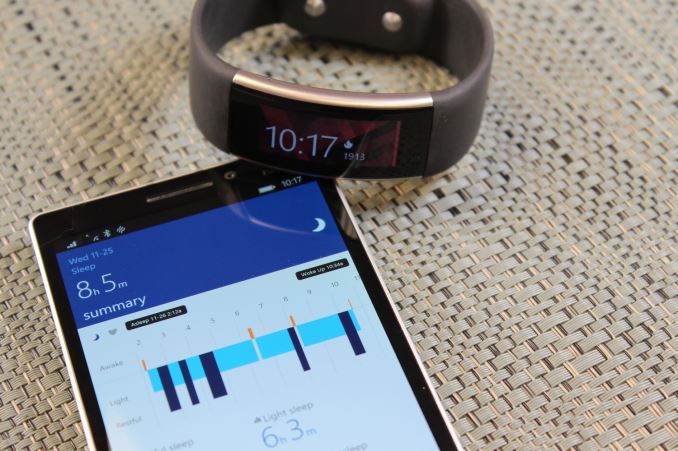The Microsoft Band 2 Review
by Brett Howse on November 30, 2015 8:00 AM EST- Posted in
- Wearables
- Microsoft
- Microsoft Health
- Microsoft Band
Final Words
I think Microsoft has done a great job on improving the Band over the first generation. The styling and comfort levels have gone way up from the black plastic first generation model. The new curved screen is exactly what the Band needed to fit a wrist more easily, and Microsoft took note that many people wore the Band with the screen on the inside, and modified the Band to work better that way. Moving the batteries from the straps to the clasp has also made the strap a lot more comfortable, and the new material is great.
Where the Band excels is in fitness tracking. Fitbit and others have a strong hold on this market, but they don’t have the cloud infrastructure like Microsoft to be able to integrate with other vendors, and to store and manage data as easily. As a fitness band, the Microsoft Band 2 is at the top tier of devices available, with enough sensors to track many metrics. The built-in GPS makes it a great companion for runners, hikers, or bikers, and the generic exercise function is a nice catch-all for pretty much any other fitness activity you want to track. It will estimate your VO2 Max while running, and if you are serious about fitness this is a great device.
It also doubles as a pseudo-smartwatch, with obvious things like a clock included, but it will run apps right on the Band as well. Eventually this is going to be merged into Windows IoT, but for now it’s a custom firmware with custom apps. If this fit into the Universal Windows Platform you could see even more potential, but for now the limited processing power of the Cortex M4 is put to good use with built-in functions that fit well into the idea of the Band, plus third party apps which can expand the capabilities. You can do Smartwatch-style tasks like read and respond to messages, get notifications right on your wrist, and even pay for Starbucks.
It's a pretty limited smartwatch though, with truncated messages and no real sense of a symbiotic relationship with the Smartphone. It’s instead another device, which syncs through the phone but is otherwise standalone. That’s great for running, but it would be great to be able to control music playback on your phone, or to be able to clear notifications on the Band which then clears the same ones on the phone. At the moment it’s further from a smartwatch than I would like.
This kind of speaks to the target audience as well. Really, the Band is targeted to people who are into fitness, and those who want to track their activities. Fitness and I have a love/hate relationship, and wearing the Band becomes a lot less useful when you don’t want to use most of its functions. For those looking for a Smartwatch, they would likely be better suited somewhere else.

At $249, the Band has gone up in price since the first genration’s $199 price, but the redesigned styling and addition of a barometer likely make it worth it, at least for those not already invested in the ecosystem. It’s in the same ballpark of pricing as similar devices that are targeted towards just fitness, so it’s nice to get the extra functionality of the Band as a bonus on top. Microsoft was pretty smart to make this a cross-platform device as well, since their own foray into the mobile world has not been as successful as they would have liked. The Microsoft Band 2 would make a great companion to anyone into fitness or golf, which is really what it is targeted at. Those who are looking for a smartwatch that works with Windows Phone also only have this option, and the capabilities of it are mostly directed towards fitness, where it excels.











56 Comments
View All Comments
jasonelmore - Monday, November 30, 2015 - link
$199?!?!?ok man, buy another smart watch with all that stuff
phoenix_rizzen - Monday, November 30, 2015 - link
Band 1 is $199. Band 2 is $249. This is definitely in the expensive range of fitness trackers.dsraa - Monday, November 30, 2015 - link
That is definietly a typo!! Since they released the Band 2, they dropped the price of the original to $99. And right now, due to holiday pricing, its $79.So go fix it......mis-information central.
Ratman6161 - Tuesday, December 1, 2015 - link
He was talking release prices...not what you could buy it for now. Anyone that wants to can do what I just did in about 10 seconds which is to typ "microsoft ban" in the search bar on Amazon.com and see $105 for the band and $249 for the band 2.This is the same with all electronic devices...prices drop over time and as soon as the "new and improved" or "Version 2.0" comes out, the original goes on the (virtual) discount rack.
Samus - Tuesday, December 1, 2015 - link
I don't know, I agree. At $250, you get basically all the same stuff in the Apple Watch for $350, which is far more featured. Healthkit is also much more advanced than Microsoft's Health SDK.etherlore - Thursday, December 3, 2015 - link
The lack of GPS in the apple watch makes it useless for running or cycling.Qwertilot - Monday, November 30, 2015 - link
Not sure about this for hiking - the big thing wearables can do for that is navigational information and the screen shape is just wrong for that vs a smart watch. Also I suspect its better to take the GPS battery load on the phone when you're out for 8+ hours.Does look pretty though :)
NesuD - Monday, November 30, 2015 - link
As far as I can tell on mine the gps is meant strictly for tracking rides and runs. I don't believe it was ever intended to be for navigating. I don't really know why anyone would think of using it that way. It has never been pitched that way.Ratman6161 - Tuesday, December 1, 2015 - link
I'd be curious to see what the battery life looks like on longer duration activities. I'm a cycling enthusiast and would really like something that could be using the GPS for 8 hours. A more typical ride for me would be 2 to 3 hours but I'm curious if it would be usable for the occasional century ride (6 - 7 hours).Zizy - Monday, November 30, 2015 - link
I read elsewhere that sleep tracking actually works without any manual parts - it senses when you sleep, so it should appear on their Health stuff even when you don't manually enable/disable it.Nice review, I especially like the comments about notifications, which seem like a missed opportunity to enable the best of both worlds.
But I miss more in-depth battery review with various sports. Will it survive night sleep tracking, entire work day and evening exercise with GPS (run/bike)? As smartwatch functionality is (currently?) a missed opportunity, majority of people interested in the device will care for the fitness part... but battery life there isn't tested - your scenario is mostly a smartwatch oriented test.